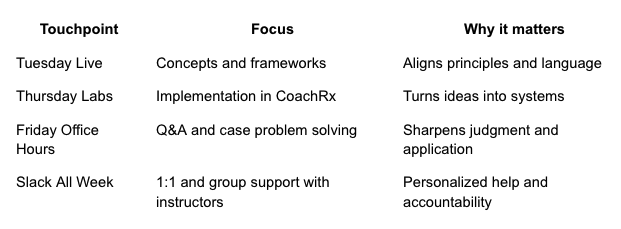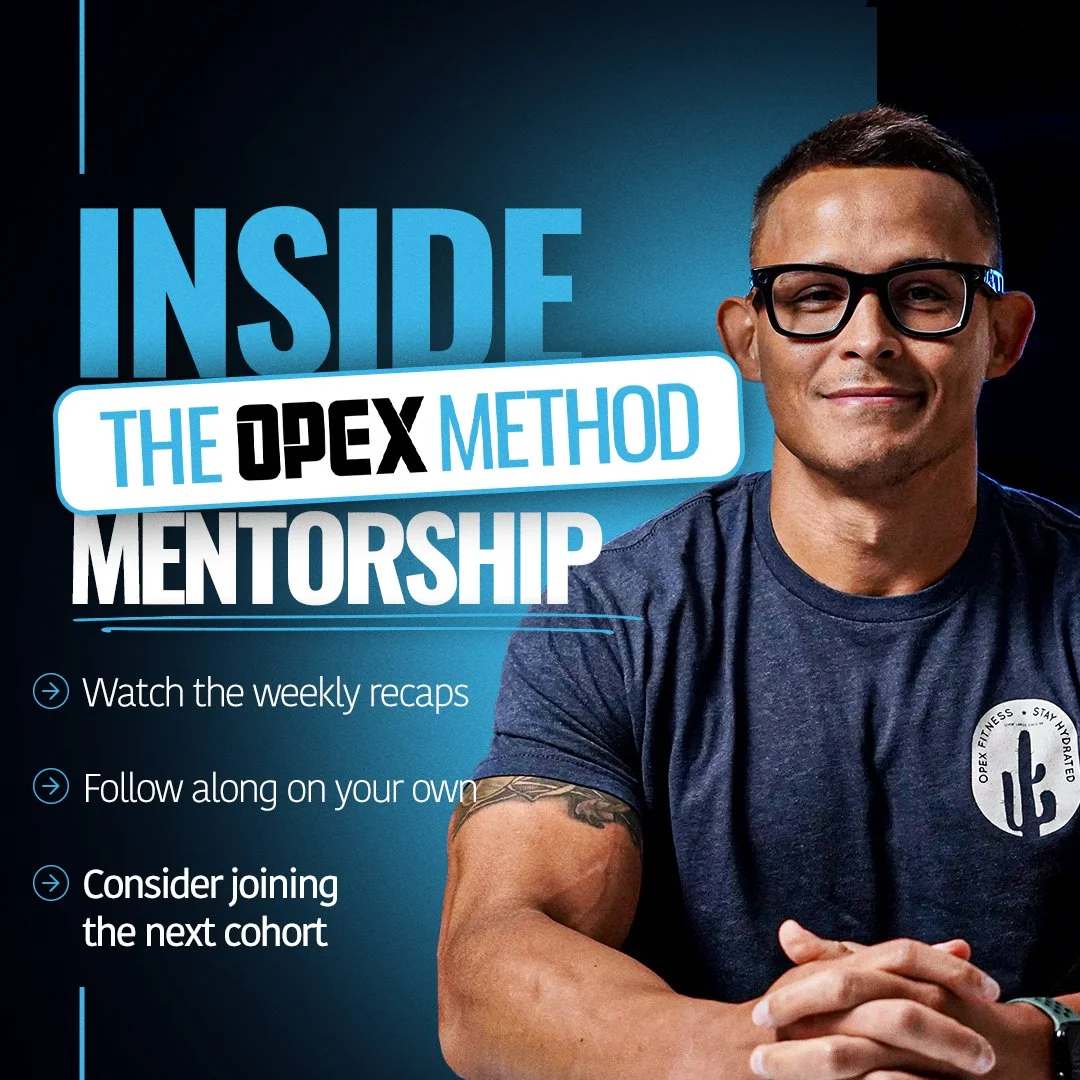Inside The OPEX Method: Week 1 Recap (Relationships)
What makes a great coach-client relationship work long term? That question sat at the center of Week 1 inside the OPEX Method mentorship. The kickoff week focused on building meaningful relationships, aligning values, and laying the groundwork for clear communication.
If you’re following along, you’ll find a practical framework to assess your own coaching relationships, plus a peek at what’s coming next. By the end of this recap, you’ll have a clear idea of how the program flows and a simple practice you can apply right now to improve your client experience.
Ready to see the rhythm of the mentorship and the biggest takeaways from the first week? Let’s get into it, starting with the big lesson that had coaches taking notes. Then preview what’s ahead as we move into assessment.
How Week 1 Ran: Kickoff, Labs, and Office Hours
The week opened with the full OPEX and CoachRx team, plus a quick five-minute message from James Fitzgerald. It set the tone. This is a refreshed approach to education, with a tight structure and hands-on support the entire week.
Here’s how the touchpoints flowed.
The weekly cadence
Tuesday live session: Curriculum focused on relationship building and the behavior section that anchors CCP. The hour moved fast, and it set the frameworks and language for the rest of the week.
Thursday labs: Implementation inside CoachRx. Coaches built intake, consultation, and check-in forms to connect directly to how they communicate and support clients.
Friday office hours: An open Zoom room full of questions, problem solving, and practical takeaways.
All week long, the Slack community stayed active. Coaches worked with the OPEX team and their assigned assistant instructors to adapt ideas to their context, whether they coach sport-specific clients, general population, or mixed rosters.
Cohort size and what’s next
This cohort was capped at 40 and sold out. Interest is already building for January. If capacity fills again, the team will open the April group registration also. If you want program details or want to talk to the advising team, read about the OPEX Method mentorship and CCP Level 1.
The Big Lesson: The Three Postures of Coaching Relationships
Coaches tend to categorize and score things. It helps to see where you stand. That’s why the week’s standout framework was the posture of your client relationships. It asks you to identify which of these three buckets you’re in, then aim higher.
Careless: It’s all about the coach. You drive the agenda, push your methods, and overlook client values. You tell clients what to do and expect it to work for everyone.
Careful: It’s all about the client, all the time. You walk on eggshells, hold back your perspective, and avoid honest direction. You don’t bring your values to the table.
Caring: You balance both. You hold space for your client’s goals and values and pair them with your own. You discuss trade-offs and find shared ground.
A caring posture is the target. It asks for honest dialogue and co-creation. You might hear, “You said you wanted X, I see it a bit differently as Y, and together we can land at Z.” That’s not a compromise with no backbone. It’s alignment with clarity.
Coaches in the mentorship found this simple model helpful because it gave them a way to self-assess. Many noticed patterns in their broader lives too, like family and partner relationships. The common thread was clear: you cannot understand others if you don’t understand yourself.
Two practices to apply immediately:
Self-audit your roster: List each client, write your current posture next to their name, and name one action to move toward caring.
Practice humility: Drop the need to be right. Ask one more question before you give an answer. Curiosity strengthens trust.
From Principles to Practice: What We Built in Labs
Frameworks matter only if they translate to action. Thursday’s labs in CoachRx focused on communication systems that support caring relationships.
Here’s a snapshot of what coaches built and why it matters:
Intake forms: Short, clear, and value-focused so new clients feel seen. The aim is to gather meaningful information instead of collecting data that gets ignored.
Consultation forms: A structure for first conversations, built to clarify goals, discover constraints, and align on expectations.
Check-in forms: A weekly cadence that keeps the dialogue going. The goal is to catch drift early, support adherence, and adapt training and lifestyle when life changes.
These tools tie back to the relationship posture. Caring relationships rely on clean, consistent communication. A well-designed form helps clients share what matters, and it helps coaches listen better.
The Program Structure, At a Glance
The mentorship follows a clear client lifecycle. Week 1 focused on behavior and relationships. Next up is assessment, then program design, and beyond. Each week stacks on the last.
What’s Coming Next: A Deep Dive into Assessment
Week 2 shifts to assessment. The team mapped the client lifecycle from acquisition to intake, consultation, and assessment, and now it is time to connect testing to design. The headline is simple, assessment means nothing if it doesn’t influence training and lifestyle.
What’s on deck:
OPEX Body: Body composition insights that guide nutrition and training choices.
OPEX Movement Screen: How someone moves dictates how you progress or regress patterns.
OPEX Work Capacity Testing: Conditioning tests that direct aerobic and anaerobic development.
The goal is translation. Tests should inform program design, lifestyle prescriptions, and nutrition strategy. No testing for the sake of testing.
Who This Mentorship Fits
Coaches in many contexts are here, from career changers to seasoned pros, and from general population to sport-specific. The reason is simple. The program teaches principles first, then practice. Principles act like guard rails, and they need to be wide. When you understand exercise, behavior, and nutrition at the level of first principles, you can apply them to any setting.
This mentorship is a fit if you want to get very good at individual design. If you can design for one, you can scale to small groups and larger groups while staying true to sound practices.
Teaching Sharpens Coaching
A theme surfaced this week. Teaching forces clarity. When you teach a concept, you must understand it well enough to explain it simply. That pressure improves coaching. It also exposes gaps.
The coaching team applies the same approach internally that they ask coaches to use with clients. Self-assess after every session, tighten what was fuzzy, and iterate. It is one reason each cohort gets better. Questions from coaches push the team to improve and to offer stronger answers over time.
Join the Conversation and Follow Along
The livestream runs across YouTube, LinkedIn, and Facebook. Questions are welcome during the stream and after. If you have a question, add it in the comments where you watch. The team reviews them and answers in the next live session. There are no silly questions. If something is blocking you, someone else is likely stuck on the same thing.
Curious about joining a future cohort or want the full curriculum?
Get the overview and next steps inside the OPEX Method mentorship and CCP Level 1.
Assistant Instructor Spotlight: Melissa Bernstein
This week’s assistant instructor spotlight goes to assistant instructor Melissa Bernstein (formerly Melissa Guitron), who got married during the first lab week. Melissa joined the OPEX Gyms program soon after Carl Hardwick and became a mentor in early 2017. She specializes in female health coaching and has grown a broad, successful practice at OPEX Kura in San Mateo, California.
Melissa’s lab roster was covered this week, and she’ll be back in action next week. She brings years of practical experience and a calm, clear way of teaching that coaches love.
Try This This Week: One Relationship Shift
Put the relationship posture framework into action with one simple exercise:
Pick three clients at different stages with you: new, mid-term, and long-term.
Name your current posture with each one: careless, careful, or caring.
Write one sentence you’ll use in your next conversation that moves you toward caring.
Example: “You said performance is your top goal, I’m seeing sleep is a limiter, let’s align on a small shift that keeps training fun and moves the needle.”
Small, honest moves build trust. Trust builds consistency. Consistency builds outcomes.
Closing Thoughts
Week 1 centered on people, not protocols. Coaching works best when you balance client values with your own and communicate with clarity. The posture framework is a simple way to check yourself and make deliberate improvements. Next week turns to assessment and how to translate testing into meaningful design.
If you’re following along, apply one change to your client communication and watch what happens. Then come back for the assessment recap and keep building. For full program details and upcoming cohort timing, explore the OPEX Method mentorship overview.
Thanks for reading and joining the journey. Got a question you want covered next week? Drop it in the comments where you watch and we’ll bring it into the discussion. Coaching gets better together when we ask better questions and aim for caring relationships.
Next Steps
Become A Professional Coach.
Wherever you are on your coaching journey, learn a repeatable and proven system to simplify program design and build a sustainable career. See how the OPEX Method Mentorship can help you find your version of success as a professional coach.
Elevate Your Coaching Business
CoachRx empowers fitness coaches to excel in program design, nurture client relationships, and scale their businesses with unparalleled efficiency and insight. Discover why CoachRx is the preferred choice for fitness coaches seeking to differentiate and deliver exceptional services.
Continue To Learn & Grow
Whether you want to write better training programs, increase your knowledge of nutrition & lifestyle protocols, or work on your coaching business, LearnRx has got you covered with courses, playlists, tools, and resources on demand. New content added monthly.



